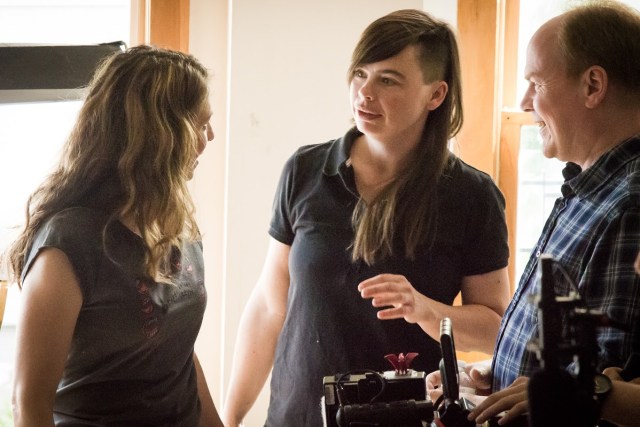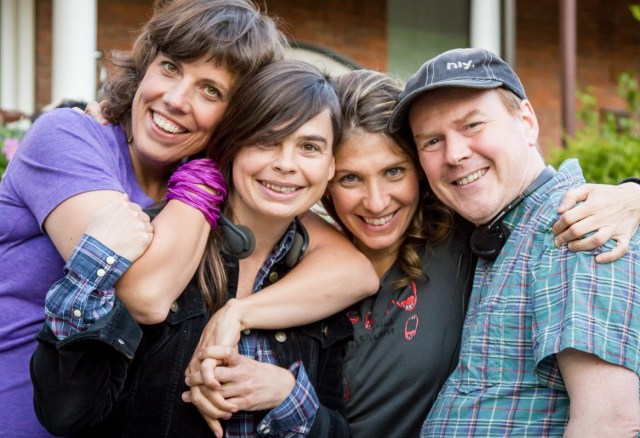New romantic comedy Portrait of a Serial Monogamist was released on DVD and VOD this week. Filmed and produced in Toronto, the comedy focuses on Elsie (comic actor Diane Flacks), a successful TV producer who ends relationships before her girlfriends can leave her. First time filmmakers John Mitchell and Christina Zeidler made the film, inspired by classic comedies such as Annie Hall, High Fidelity, and Alfie. I spoke with the two filmmakers about using Toronto as a true setting, Elsie as a likable screw-up, and why the struggle to get more women behind the director’s chair starts at the money.
Lesley Coffin (TMS): I was really surprised by the approach that you guys took with it. Who came up with the premise?
Christina Zeidler: We both did. The idea came when we were having drinks one night and we were—I had just finished watching … I think it was High Fidelity, and Mitchell and I were saying how much we loved the movie. And I was saying how in those movies there’s always a lead male character who is a lovable screw up. They don’t always make all the right choices but they’re funny and charming, and so as an audience you really like them. And that I hadn’t really seen a female character in that kind of a role. The female character is either the eye candy or the character beyond reproach, her actions are perfect but you probably don’t like her. And so we both really liked that idea, of playing with the genre a little bit.
TMS: And did you guys always know that you wanted it specifically be about a woman in lesbian relationships?
Mitchell: That came about a little bit later. It started out as the idea of having a woman in that role that we’ve seen in romantic comedies before. High Fidelity and the Woody Allens of the world and that kind of thing. And then Christina, when we started talking about the idea, she said “How would you feel about—if the character was a lesbian?” And I thought that was also something I’ve never seen before either. It added to the originality I think in our minds of the story. So we embraced that idea and went with that.
TMS: So besides things like High Fidelity and Annie Hall, were there other films that you guys took a look at what the genre about these types of films are?
Mitchell: Well, it’s definitely a romantic comedy. The romantic comedies and stylish romantic comedies were a big influence. We love dialogue, we love really rich dialogue and we knew we wanted it to be a conversational film. We also looked at—when we were talking about the idea of having Elsie break the fourth wall and address the audience, we looked at a film, Alfie, from the 60’s with Michael Caine. He acts as a to the audience but also happens to be incredibly un-self-aware, talking to the camera and kind of trying to work things out by talking. And we thought that would work for our film. Having a lead character that—the audience is way ahead of her, but she’s trying to keep them all in her side, she’s trying to rationalize things, she’s trying to justify her behavior to herself by justifying it to us. And we liked that. That was an interesting approach to take.
TMS: So did you know some of the actors that you guys ended up casting before hand through the Toronto arts and film scene?
Zeidler: Yes, definitely. We started the process for making the film with a trailer, so we had to cast for the trailer. And the promise of that was that the people in the trailer we would bring them with us once we got financing for the movie. And we did consciously look at our friend group and our creative collaborators to fill those roles. Mainly because we wanted to—we feel like there’s a very talented group of people in Toronto, who don’t often get seen in movies because it’s difficult to keep a career going in movies in Toronto. They’re so fabulous and funny, but sometime people forget there is a talent base in Toronto to draw from.
TMS: You even say that in the film about, “This is Toronto, not the Toronto that’s used as backdrops for other places. “
Mitchell: We wanted to present the city the way we see it, and we haven’t really seen it represented in movies that way. We considered it a character in the film the same way Chicago is a character in High Fidelity or Manhattan is a character in Annie Hall.
TMS: And you make a very specific point that there is a very active area of the City that has a pocket of gay and lesbian activity in it that’s really vibrant and public. Where exactly is that?
Zeidler: It’s Parkdale, Toronto. And there are many places where there are gay people in Toronto. There is sort of a West Hollywood area in Toronto called Church Street in the west and our area, Parkdale, is more of the alternative scene. And so more lesbians, and trans people, and alternative gay men, and artists, and actors and everybody. So we wanted to think of the idea that it feels very small town and has a very, very tight-knit group. So we decided to set it in Parkdale.
TMS: And it’s interesting because there are very few men in the film. Was that something that you guys did on purpose or was it just—it happened that the characters that you picked out and thought would be within this group of friends were all female?
Mitchell: It was a bit of a conscious decision I would say in that like the romantic comedies we were referencing, there’s often a tight, male-dominated friend group. And we thought, “Oh let’s do this with this Elsie character and her really close female friends.” And then when we were writing it Bridesmaids came out. But we also wanted to show the whole world of Elsie, so we added work scenes. And originally when we were writing it, the role of Karen, her boss at work, we were going to cast a guy in that role. It was influenced by someone, an iconic figure from Toronto. And then we ended up changing that. But with family and with work and so on, we wanted to widen the scope a bit. But it really is about this core friend group and their relationships, and the relationships within Elsie within her particular community, and those happen to all be with other women.
TMS: One of the other really interesting things is the film feels very nonjudgmental of Elsie? Whatever she does, she is never viewed as a bad person or someone who needs to get her due. She does a couple of bad things but she is generally considered a decent, good, likable person. And I think other films might have been harder on her and tried to redeem her.
Zeidler: We never felt that she was a bad person, just that she is her own worst enemy. She didn’t necessarily need some great come up ends because it’s her fatal flaw, this serial monogamy problem that she has. In the end, it’s the thing that undoes her. And she’s not, as you said, a bad person.
Mitchell: She’s really not a bad person, she’s a real friend when she’s committed to somebody. But she has this problem, this fatal flaw where she has to leave them before they leave her, and this denial around her behavior and the consequences that it causes. We get a mixed reaction. Actually it’s interesting because some people, most people, are okay with Elsie but they do acknowledge that she does some awful things. In the end she’s a moral person and she’s a loving person with her friends, she’s just a bit of a screw-up.
Zeidler: I think one cliché we wanted to get rid of is with this group of women friends, not everybody is capsizing or finger-wagging and yelling at her to change. Also, not everyone is as invested in our love life as much as we assume. So the other characters weren’t hard on her, they mostly just give advice from their own perspective. We’re all a bit self-absorbed. Everyone’s a bit self-absorbed when it comes to relationships. You feel like if you’re in a long-term relationship then you are successful with relationships, and you know how they are done. But meanwhile, what does anyone know about relationships really? I think that was part of it. We didn’t want to create a right or wrong within the film about relationships and dating. So Elsie’s journey is simply her own.
TMS: Once you decided that the characters would be in lesbian relationships, did you think about that old, very tired cliché, about committing for life and jumping into commitment relationships too quickly?
Zeidler: That was definitely the serial monogamous joke in the title. I mean, I think that that just plays as a joke because it’s such a cliché. We’ve all heard the joke “what does a lesbian bring to a second date? A U-Haul.” That’s literally “the joke.” I think that was deliberate, we wanted to play around with that idea. Yes, I think we definitely were referencing that joke with a wink.
TMS: In terms of the work life that you show, and how her professional life parallels her romantic relationships, why didn’t you pick the job of TV producer?
Mitchell: That was a bit of homage to a station in Toronto at a time when we were subtly referencing the 90s. I think early 90s would have been Elsie’s coming-of-age, when she was really hot and happening. Anyway, we wanted to reference this Toronto station and make her music producer and a television producer, because she at least thinks she has very good taste and she’s really plugged in to what’s happening. But now at this point in her life it’s kind of like a lot of things with her. That time has passed. The time for her behavior like changing girlfriends, she’s a little passed it. And with her career it was probably time to leave five, six years ago, but she’s hanging on to this idea of this music show that doesn’t really exist anymore. She leaves relationships too soon, but stays at her job too long.
TMS: You mentioned the fact that if it were a guy in the lead, this behavior makes him a likeable, endearing lead, but it is harder for female characters to not be dismissed as too unlikable to focus a film on. Did you consider the question, is she likable enough, while making it?
Zeidler: That question keeps coming up because even though we see all these anti-heroes, especially on TV, they are often male anti-heroes. And I think that we were trying to add to the canon. I don’t think we were trying to make an anti-hero out of Elsie at all. We’re trying to make a real person out of her, because I think the serial monogamist is a real person. It’s not an anti-hero or somebody that you revile. They are a complicated person who is essentially a good person with her own code of ethics that she really in protecting herself from hurt. We felt the need to add a female character like that into the canon, especially in queer film. I haven’t seen a lot of women in comedy and queer films that were not about just coming out. So somebody who’s already out, who has a life as a queer person. This is really about her as a human, her life, her world.
TMS: The movie strikes me as pretty universal, but movies focused on lesbians tend to get put into specialty categories. Did you talk at all about who the movie was targeted at and the cross-over appeal it might have?
Mitchell: I wouldn’t say we were concerned about that. We definitely feel that there are some universal themes in the movie that connect to a lot of different groups of people, to a wider audience. The heart of the movie is essentially a romantic comedy and it is about relationships, and it’s about these particular people, and these particular women and yes, they’re gay, but it’s also about the struggle to figure yourself out and find who you’re meant to be with. It was very, very important to be authentic to this group of people and community and to appeal to a core audience. That was a firm goal for us. But at the same time, feeling that there are so many films out there and there’s so much going on, but if we can get it out there and audiences are open minded, then we do feel that gender wise and sexuality wise there are no barriers to this movie, so it should appeal to a wide audience.
Zeidler: We also did think about it when writing the jokes but we had to write jokes that were savvy enough for a queer crowd who have heard a lot of the jokes, to still think it’s funny or surprising to them but also would play to a crowd that won’t know all the cues. That’s a fine balance. For audiences that aren’t familiar with the queer world it’s a peek behind the curtain. It’s fun to understand more about it and also you can be like “Oh, that’s how people talk. That’s what’s funny to them.” A peek into their world.
TMS: We’re so used to romantic comedies where the characters are very young and their romantic experience is very limited, but they are still in crisis. Whereas you make it very clear that she’s had 20 something years of relationships and experience. What made you Elsie in her 40s?
Zeidler: Part of it is just that we’re middle age, so that is part of our experience. And certainly the idea of the serial monogamist requires time and experience. If we set her in her 20s, it’s not as probable at that point. You can write it off as it’s the beginning of a relationship and there isn’t a pattern yet. I think the character necessitated that. I think also we did want to make something we could relate to as writers right now and write from that authentic point of view.
Mitchell: We also felt it was nice to show women in the film who are playing their own age. They are authentically who they are. They aren’t obsessed with youth, and they’re beautiful in their own way and they’re beautiful because they’re completely themselves. All the actors we cast are amazingly talented and attractive because they are themselves. And it’s nice to put that on the screen and not try to make something more Hollywood, where everyone has to be perfect looking.
TMS: What made you guys decide to write and direct as a partnership?
Zeidler: It was something that happened the moment we came up with the idea during drinks. We decided to write it together, make the movie together and to direct it. It started right from that place. And then I think our experiences as creative people have always been collaborative. It didn’t seem that odd to us. It worked perfectly.
TMS: I don’t know very much about the Toronto film industry and how different it is from the US film industry, but there’s all this talk right now about getting more and more women and more minorities into the directing chair. And I was just wondering if you had any feedback from people. Christina you can of course speak of these experiences personally, but I know John is a big fan of Elaine May and you’re working on a documentary about her.
Mitchell: Yes. Absolutely. Elaine May is one of my favorite directors and I’m working on a documentary about Ishtar. I think a lot of the criticism leveled against her was because she was a woman. I mean there’s no getting around that. And being a very strong unique female voice at that time was problematic. There’s no question about it. Right now, I don’t know. Christina can speak more to this I’m sure. But we know some women directors in Toronto, but there’s certainly not enough in comparison.
Zeidler: In general, I think acting and doing this movie, the real difficulties in the film industry are more in the distribution side of it. It is harder for women and minority filmmakers to get their work out and in front of audiences. And so it makes funders and people who are giving out money more conservative. Especially in Canada, you have to have an established name, you have to be attached to an established producer. So for the idea of new voices to come up or there to be experimentation in a new storyline, it makes all those things more difficult. There’s not as much risk taking going on among distributors and producers.
So I think that that’s really where all of the challenges need to come from. Even on TV, which seems to be taking more risks, it is still a lot of male dominated storylines about tired old clichés about male power. I just watched that Billions show and can’t even believe that we have to watch it and it’s considered anything new. That is the most tired cliché of all time. And there is clearly a lot of money and resources put into the production, and it just got a second series. I think one movie by a woman, like Bridesmaids, distributors think now we don’t need any more comedies by women because we’ve met their quota. So I think it’s, yes, a bit of same old and that really has to change at the funding level, and that means taking more risks on new voices.
Mitchell: One thing I would say though, on a positive side, this new way of crowd funding is interesting. This model of going directly to your audience and appealing to them and getting things funded that way does hopefully open up some avenues for people to—not just women but people who traditionally don’t have a presence.
Zeidler: And I think that does go back to that idea that you were talking about before of this idea of collaboration. That really when we can collaborate together and add energy to projects, better stuff from different people can get made. And quick shout out to our distributors, Wolf, who have been huge supporters of queer films for 35 years. And have been absolutely wonderful and followed us from our Indiegogo stage and they’re just—we can’t say enough about how amazing they’ve been.
—Please make note of The Mary Sue’s general comment policy.—
Do you follow The Mary Sue on Twitter, Facebook, Tumblr, Pinterest, & Google +?











